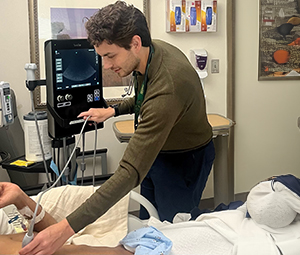
By: Ahmed Saleh
The seven security guards blinked at me as I stood outside the emergency department bathroom. Out of the door blasted a disheveled man, hiking backpack, boots, and a wad of cash in his hand. “Let’s talk,” I asked him as he brushed by me, close enough to make security stand on edge. He returned to his room with his accumulated entourage all in pursuit. I spoke to him, at length, about his medical problems, his substance use, his thoughts of not wanting to be “here” any longer. Our medical team convinced him to stay; three days later, he was discharged to the substance use program who had denied him three admissions prior.
The next day we admitted a patient who had been here before. Multiple times. His presence was marked by frequent medication refusal, throwing things, and frustration from all parties involved in his care. Despite this, our stellar nursing staff and medical team treated him with the respect that he may not have earned, but he nonetheless deserved. At the end of his second week with us, he was antsy to leave the hospital. He had already called his ride, and at this point I could not convince him otherwise. “AMA” are the words he used, and he didn’t care - he’s getting out of here. The next morning, I find him in the same room. “Doc,” he said, “you know why I stayed?” I raised my eyebrows in reply. “It was because you said you were disappointed in me. I trust you. I want to get better, I just don’t know how.”
In the ICU, Dr. Stephanie Krick made us chuckle every time she entered a room with her upbeat “Yoo-hoo, Dr. Krick here.” She explained everything she was doing to the patient regardless of if we thought they could hear us. Our team began modeling this. Jumps in heart rates and spontaneous movement toward our cold stethoscopes accompanied our one-on-”none” discussions. While not all patients could hear us, where was the harm in seeing and speaking to them as people?
At what point do we become a doctor? I don’t believe it is when we put on our short (or long, for that matter) white coat. It isn’t when we have the two-letter suffix. It is certainly not when we pass Step One, Two, Three, or beyond. We become a doctor when we are someone’s doctor; when they place their trust in us to heal. Someone’s physician seeks answers on behalf of their patient. To be someone’s doctor is not a set of checkboxes, it’s a set of experiences. Thankfully, residency is a set of experiences that creates a myriad of anecdotes that improves the care we give.
Residency is the opportunity to gain “experience” without the risks associated with independence. It allows patients to look to you as the “Doctor” without them knowing how much you were taught outside the room. Residency serves as the mortal combat against imposter syndrome.
I asked these patients what made them stay in the hospital despite their urge to leave. The patient, now in rehab, said our team treated him like every other person instead of seeing him for his ailments. The now-extubated patient blinked back tears, and said they could hear us talking to them while they were “supposedly asleep.” No patient will tell you to treat them like an object or their diagnosis. Despite the thrill of central lines and hyponatremia, the most valuable lesson I have learned in residency so far is the humanism in how to be someone’s doctor. That someone is a person, after all.